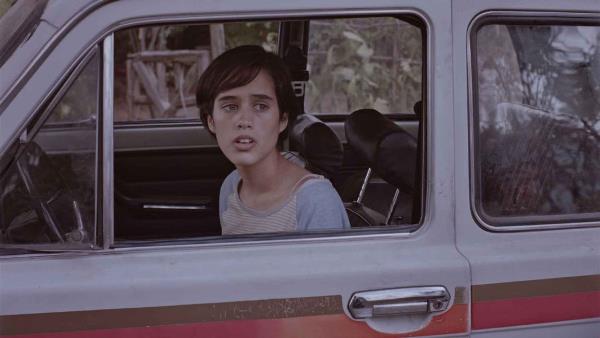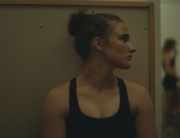This languid yet richly observed Chilean drama kicks off with an adolescent girl, Carla (Magdalena Tótoro), losing her dog as her family is relocating to an isolated commune. While it may seem like a relatively minor event, Carla spends the entire subsequent summer trying to find her beloved animal.
She is not the only one turned upside-down emotionally over the course of the film. At the commune, Carla occasionally crosses paths with Lucas (Antar Machado), the teenage son of Bohemian artists who hungers to experience more of what the world offers—or at least learn how to drive. Lucas seems to be involved with Sofía (Demian Hernández), who is about his same age, although what they have seems like puppy love at best. At least it’s rather temperate compared to the sparks that fly between her and Ignacio (Matías Oviedo), an adult outsider who charms her with his rugged good looks, and perhaps more importantly, the fact that he’s from the city.
Sofía hatches a plan to leave the rustic commune, where the leadership believes all members should bear the costs of their self-sufficiency equally, to be with Ignacio. She lives with her father and brother in a spacious cabin, while her mother, who is separated from her father, resides in the same city as her new paramour, and so Sofía invites her to the upcoming New Year’s Eve party, where she will ask her about moving in. There is a naiveté to Sofía that makes sense given her age. Back when we first meet her, she shares fantasies with Lucas, and one of hers is to live a more contemporary life—for example, she wants a house with a vacuum cleaner. It is consistent with her character to expect all of her dreams to unfold perfectly, which, of course, also sets her up for heartbreak.
Director Dominga Sotomayor Castillo spends most of her time following the three young protagonists, and through Sofía and Lucas, she captures the reality that being a teenager often means waiting for life to happen. There are countless scenes in which the teens are simply passing the time, which can involve lounging about their respective families’ homes or practicing for the talent show portion of the aforementioned party. Castillo, however, invests these moments with tremendous importance, using long takes and often emphasizing her characters’ faces as they quietly stare out into space. We get a sense of their rich inner lives in which they imagine all the possibilities that the future holds.
Too Late to Die Young is set in Chile in 1990, just a short time after the resignation of longtime dictator Augusto Pinochet, and as such, life at the commune is depicted in a mostly pragmatic tone. That the adults would be seeking a more “pure” way to live after enduring Pinochet’s cruel and corrupt government makes sense, but there is also the implication that they are making up the rules as they go. For example, we see livestock animals living practically nose-to-nose in makeshift bedrooms. At the same time, liberation never quite turns to excess. Even when the fateful New Year’s Eve party reaches its crescendo, the vibe is a mostly chill one, although there is drinking and a little implied drug use.
The actors all do strong work, especially Hernández as Sofía, in a performance that conveys the morose, occasionally histrionic tones of teenagedom perfectly. If any one scene in particular is a standout, it is when the character, sad-sounding accordion in hand, performs the Bangles’ “Eternal Flame,” baring her soul to the entire commune. Much of the pre-release hype surrounding the film mentioned that Hernández is transgender, but that is immaterial to the plot and doesn’t change that fact that she gives a brave and vulnerable performance, capturing the raw hunger that Sofia feels for life and love.
Tótoro also deserves much credit for her performance as the wiser-than-her-years Carla, and while she doesn’t say much, we can perceive just how much she understands. As for her quest to find her dog, it takes a surprising turn when her parents believe they have found it. She, however, is never certain that this is her beloved pet. By the end, the big animal becomes an apt metaphor for the feeling of comfort and security that all of the adults in the film seem to desire, but unlike them, Carla realizes it’s impossible to force.
Too Late to Die Young is less nostalgic than other coming-of-age films, but its unique setting and uniformly fine acting definitely set it apart.
from Cinema Tropical on Vimeo.

















Leave A Comment